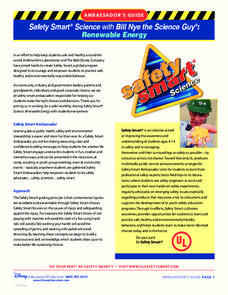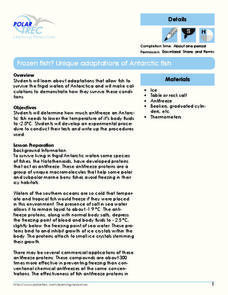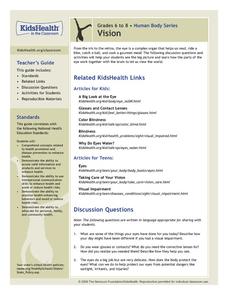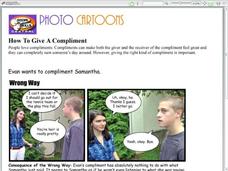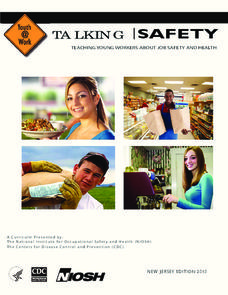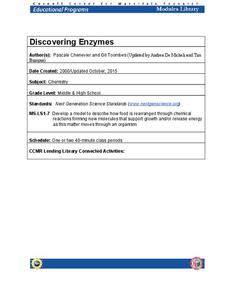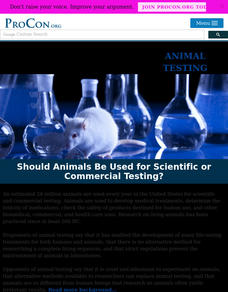Disney
Renewable Energy
Bring some energy to your physical science curriculum with this engaging Bill Nye the Science Guy instructional activity. Based on his Renewable Energy video, young scholars explore the concepts of potential and kinetic energy and learn...
Polar Trec
Frozen Fish? Unique Adaptations of Antarctic Fish
Some fish contain proteins that act like antifreeze in order for them to live in the frigid waters of Antarctica! High schoolers determine how much antifreeze a fish needs to lower its body temp to -2.5 degrees. Teachers act as a...
Nemours KidsHealth
Vision
From the iris and retina to glasses and contact lenses, learners will be excited to see what activities are in store for them as they learn about the complex organ of the human eye.
Curated OER
From Gene to Protein ~ Transcription and Translation
Translate the process of protein synthesis to your molecular biologists with this instructional activity. It consists of reading, completing a table as a summary, comprehension questions, and a modeling activity for both transcription...
Read4Health
Piggybook: A Read4Health Lesson Plan
"You are pigs." With those three simple words, the lives of the Piggott family were changed forever. Read aloud the children's story Piggybook by Anthony Browne and teach your class the importance of personal responsibility, learning...
Curated OER
Rainy Day? P.E. Anyway!
If your PE class is faced with bad weather and must stay indoors, try one of these activities to keep them engaged and moving! Activities involve working in teams, identifying sports or parts of the body, coordination practice, and/or...
Social Skills Central
Photo Cartoons: How To Give A Compliment
Help learners develop the ability to offer appropriate, meaningful compliments to others—an essential social skill. Here you'll find a quick photo cartoon illustrating a right and wrong way to give a compliment, as well as a brief...
Centers for Disease Control and Prevention
Talking Safety
Chances are, many of the teens in your class have jobs or want to have jobs in the near future. Educate them about the hazards and emergencies that could occur in various workplaces with a set of lessons published by the National...
Outdoor Learning Center
Outdoor Survival
Which of the following can you survive without for the longest time: water, food, or a positive mental attitude? The answer may surprise you. Guide learners of all ages through games, activities, and discussions about surviving in the...
Cornell University
Discovering Enzymes
Explore the function of enzymes through a series of lab investigations. Learners use household enzymes such as hydrogen peroxide to model the role of enzymes. The enzymes break down proteins with and without a catalyst.
PBS
Stories of Painkiller Addiction: Decisions and Consequences
Teach young learners that most drug addictions end in one of three outcomes: treatment, jail, or death. After watching a short video segment on the consequences of drug abuse, class members discuss what they viewed and consider what...
Curated OER
Animal Testing
Animal testing: cruel and inhumane, or innovative and life-saving? Scholars explore the topic and form their own opinions with help from the highly informative website. Pupils read a comprehensive overview of the topic, including...
Florida Department of Health
Understanding the Risk of Substance Abuse Unit
Teenage brains are different! Understanding that the teenage brain is still developing and thus more impacted by substance abuse is the key concept in a three-lesson high school health unit. Participants learn about how the brain and...
Curated OER
California Fights Sugar
Scholars read articles and have a class discussion on California's efforts to fight obesity. They will read and discuss the effects of sugar on the body and the soda tax that is being proposed in California.
Curated OER
Crystal Growing
Young scholars grow crystals and document their observations by recording timeing and growth. Additional characteristics of crystals are observed under a black light, by growing under different conditions and mineral content is determined.
Curated OER
Children of Alcoholics Group
Ninth graders identify characteristics of alcoholism, resources available to them and their family within the community and school, and look at strategies to help them increase safety and anger management strategies too.
Curated OER
Biomedical Devices for the Eyes
Students study the structures of the human eye. In this eye device lesson plan students examine different eye problems and devices that can help to resolve them.
Baylor College
Making Copies of an HIV Particle
In the second of five lessons about HIV, discover the mechanisms that allow the HIV virus to replicate. Using the models that they created the day before, learners examine the parts of the virus particle. The lesson plan does not say...
Curated OER
Safe and Sanitary Work Habits - Level 1
Students brainstorm hazards in the kitchen, and categorize them. They develop a checklist that could be used by an inspector to evaluate a home economics foods laboratory. They create a recipe while using proper lab and safety procedures.
Curated OER
Defining Hazardous Waste
Students examine the relationship between hazardous substances and hazardous waste. They identify toxic chemicals and how they are disposed of. They work together to answer questions about how they are improperly used.
Curated OER
Floodplain Modeling
Students simulate the impact of fluctuating river volumes on structures and landforms. They experiment with table top-sized riverbed models and water. Students consider how human design can help mitigate the effects of a flood.
Curated OER
How Hot Is Hot In Namib?
Students research and demonstrate the temperatures of the Namibian Desert. They watch and discuss a video, conduct an experiment to demonstrate the desert temperatures, record their results in the form of a graph, and compare/contrast...
Curated OER
Surviving Extremes
Students examine the potential health dangers of mountain climbing in high altitudes and deep-sea diving. They write a health and safety column for a fictional magazine about extreme outdoor sports that explains the risks involved in...
Curated OER
World Hepatitis Day
In this World Hepatitis Day worksheet, students complete activities including reading a passage, matching phrases, fill in the blanks, correct word choosing, multiple choice, sequencing, unscramble the sentences, write questions, take a...
Other popular searches
- Safety and Injury Prevention
- Injury Prevention Safety
- Prevention of Injury
- Injury Prevention Primary
- Safety, Injury Prevention
- First Aid Injury Prevention
- Injury Prevention and Sport
- Injury Prevention Bikes
- Art Injury Prevention
- Pe Injury Prevention
- Sports Injury Prevention


